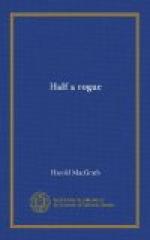At length the great city called him, and the lure was strong. He answered, and the long battle was on. Sometimes he dined, sometimes he slept; for there’s an old Italian saying that he who sleeps dines. He drifted from one paper to another, lived in prosperity one week and in poverty the next; haggled with pawnbrokers and landladies, and borrowed money and lent it. He never saved anything; the dreamer never does. Then one day the end came to the long lane, as it always does to those who keep on. A book was accepted and published; and then followed the first play.
By and by, when his name began to figure in the dramatic news items, and home visitors in New York returned to boast about the Warrington “first nights,” the up-state city woke and began to recollect things—what promise Warrington had shown in his youth, how clever he was, and all that. Nothing succeeds like success, and nobody is so interesting as the prophet who has shaken the dust of his own country and found honor in another. Human nature can’t help itself: the women talked of his plays in the reading-clubs, the men speculated on the backs of envelopes what his royalties were, and the newspaper that had given him a bread-and-butter pittance for a man’s work proudly took it upon itself to say that its columns had fostered the genius in the growing. This was not because the editors were really proud of their townsman’s success; rather it was because it made a neat little advertisement of their own particular foresight, such as it was. In fact, in his own town (because he had refused to live in it!) Warrington was a lion of no small dimensions.
Warrington’s novel (the only one he ever wrote) was known to few. To tell the truth, the very critics that were now praising the dramatist had slashed the novelist cruelly. And thereby hangs a tale. A New York theatrical manager sent for Warrington one day and told him that he had read the book, and if the author would attempt a dramatic version, the manager would give it a fair chance. Warrington, the bitterness of failure in his soul, undertook the work, and succeeded. Praise would have made an indifferent novelist of him, for he was a born dramatist.
Regularly each year he visited his birthplace for a day or so, to pay in person his taxes. For all that he labored in New York, he still retained his right to vote in his native town.
A sudden desire seized him to-night to return to his home, to become a citizen in fact and deed. It was now the time of year when the spring torrents flood the lowlands, when the melting snows trickle down the bleak hillsides, when the dead hand of winter lies upon the bosom of awakening spring, and the seed is in travail. Heigh-ho! the world went very well in the springs of old; care was in bondage, and all the many gateways to the heart were bastioned and sentineled.
“Sir, a lady wishes to see you.”
Warrington turned. His valet stood respectfully in the doorway.




